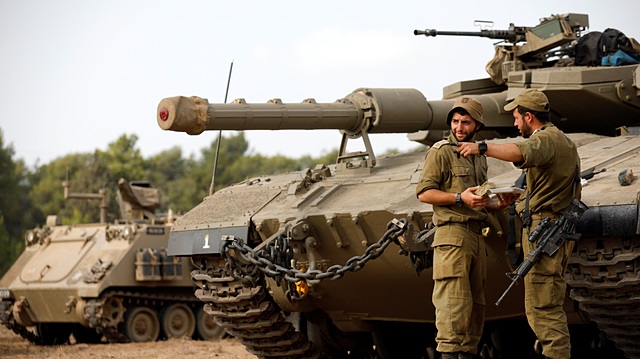
‘The rules of the game are about to change,’ Haaretz quotes Israeli housing minister as saying
Israel’s Security Cabinet on Thursday ordered the military to step up its response to ongoing Palestinian demonstrations along the Gaza-Israel buffer zone, according to Israeli media reports.
“Starting Friday, the military will intensify its response to airborne firebombs from Gaza and will extend its range of fire during protests along the border,” Israeli daily Haaretz reported.
According to the new policy, Palestinian protesters will have to maintain a greater distance from the buffer zone -- otherwise, Israeli troops have been ordered to open fire.
“The response to incendiary balloons and kites launched from Gaza will be more forceful,” the paper asserted.
According to Haaretz, the Security Cabinet convened for five hours late Wednesday after a number of rockets were fired into Israeli territory from Gaza.
Israeli Defense Minister Avigdor Lieberman and Education Minister Naftali Bennett have both repeatedly called for a harsher military response to the ongoing rallies along the buffer zone.
Most other members of the Security Cabinet, however, including Prime Minister Benjamin Netanyahu, reportedly want to avoid a broader military operation.
Cabinet members were reportedly told not to speak to the media about issues discussed at the meeting.
This did not prevent Housing Minister Yoav Galant, however, from making provocative comments to reporters.
"I am not commenting on the content of the cabinet discussions, but I can say one thing very explicitly: the rules of the game are about to change,” he said.
“We will no longer accept the terror along the border fence,” Galant asserted.
In a related development, the Ezzedine al-Qassam Brigades, the armed wing of Hamas, threatened on Thursday to respond to any Israeli attack on Gaza.
On its official website, the Brigades posted a brief video showing a Brigades fighter preparing to fire a salvo of rockets into Israeli territory.
Since the rallies along the buffer zone began on March 30, more than 200 Palestinians have been martyred -- and thousands more injured -- by Israeli army gunfire.
Protesters demand the right to return to their homes in historical Palestine from which they were driven in 1948 to make way for the new state of Israel.
They also demand an end to Israel’s 12-year blockade of the Gaza Strip, which has gutted the coastal enclave’s economy and deprived its roughly two million inhabitants of many basic commodities.











